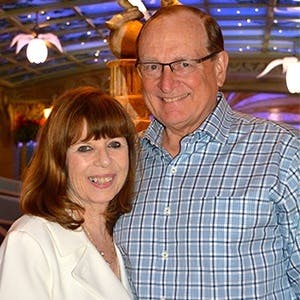
Michael and Noreen Potempa had just retired and were looking forward to the next chapter in their lives together when the devastating news hit.
While recovering from knee replacement surgery in February 2013, Michael started experiencing double vision. He thought it was a side effect from the pain meds, but when his vision didn’t improve, he went to a neuro-ophthalmologist who recommended an MRI. “Within hours of the MRI, the doctor called to say they’d found a growth,” Michael recalls.
“We decided to have the growth removed as soon as possible since the doctor’s consensus was that it was a benign pituitary tumor that could easily be removed. But when I woke up from surgery, the surgeon told us that it was something called chordoma, and he couldn’t remove it completely without damaging my eyesight, hearing, or causing other serious deficits. This news was shocking and terrified me.”
The Potempas had never even heard of chordoma, and the diagnosis sent the couple and their three adult children into a high-gear “quest for knowledge,” as Noreen puts it. On the Chordoma Foundation’s website, the retired teacher read about treatment protocols for clival chordoma, watched video presentations from Foundation-hosted conferences, and learned key information and protocols for the most successful treatment of chordoma. She also reached out to others battling chordoma via the Chordoma Survivors group on Facebook and drew inspiration from their stories.
“We were being told that no more of Michael’s tumor could safely be taken out, that we should have proton beam therapy locally here in Chicago, and that we could anticipate a five- to seven- year average life span. That certainly put us into a tailspin. We had just celebrated our 40th wedding anniversary and had to find the best treatments that were available for him, so I basically took a course in chordoma 101.”
The research process led the Potempas to Dr. Gary Gallia, a skull base surgeon at Johns Hopkins Hospital, and Dr. Norbert Liebsch, a radiation oncologist at Mass General – two of the country’s foremost experts in the treatment of chordoma. During two 12-hour surgeries in August 2013, Dr. Gallia was able to remove all of Michael’s tumor. Four months later, he completed proton beam therapy with Dr. Liebsch. Since January 2014, Michael has been cancer-free.
“When Dr. Gallia came into the hospital room that morning after the second surgery and told us there was no longer any evidence of the disease, Michael and I looked at each other and said, ‘We’ve been given a gift. Now we have to help others.’ We decided right there in that hospital room that we would do what we could to raise awareness and money for chordoma.”
In October 2014, the Potempas held their first fundraiser: a cocktail party in the Chicago suburbs with friends and family, where Michael told his story and explained the importance of support for chordoma research. Chordoma Foundation Executive Director Josh Sommer also spoke. On September 27, 2016, the couple hosted another fundraising event near Chicago, this one featured Dr. Gallia. All proceeds went to the Foundation to support clinical trials to test promising new therapies.
“Mick and Noreen know what it’s like to face the fear and uncertainty of living with chordoma. But instead of letting it consume them, they turned it into an opportunity to improve the odds for everyone. It’s thanks to the selfless efforts of families like theirs that we’re able to make the investments needed to speed the path to new therapies and cures,” says Josh Sommer.
Michael believes that raising awareness about the treatment options available to chordoma patients is as important as raising money to find better treatments. “This is such a rare disease that even really excellent doctors and surgeons may not know much about it. That’s why it is so important to seek out chordoma experts to achieve the best possible outcome. Unfortunately, there are no guarantees, but your odds really go up if you get to the right people.”
Grateful that Michael is now healthy, the Potempas are enjoying retirement while working with the Foundation to support fellow patients and families. “We are forever grateful to Josh and the Chordoma Foundation, Dr. Gallia and Dr. Liebsch because all were instrumental in saving my husband’s life. The Foundation’s work and what we learned about doctors and treatments led us to make different, and better, decisions,” Noreen says. “At that point when you are paralyzed with fear, the Foundation provides the resources, the support, and the hope for the future. We want to support the Foundation so it can help other families facing this challenge.”